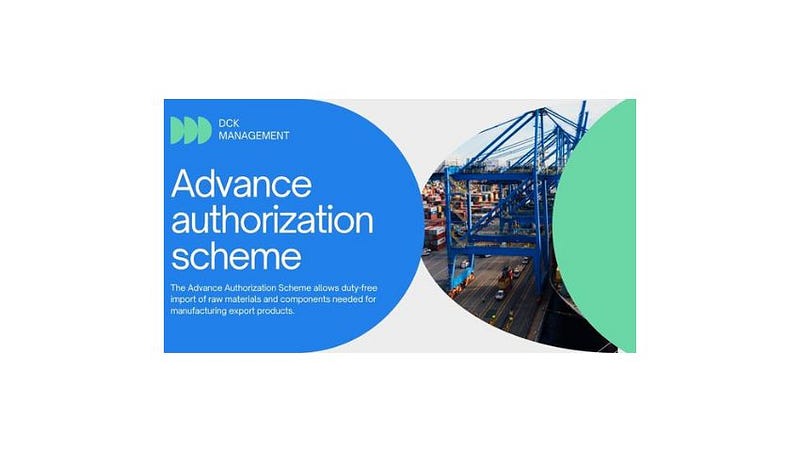In today’s globalized market, Indian exporters face fierce competition. The Advance Authorization Scheme (AA Scheme) offered by the Government of India through the Directorate General of Foreign Trade (DGFT) is a powerful tool to enhance their competitiveness and boost export volumes. This scheme incentivizes exports by allowing duty-free import of raw materials, components, fuels, and consumables used in the production of export goods.

Understanding the Advance Authorization Scheme
Benefits for Exporters:
- Reduced Production Costs: By eliminating customs duties on imported materials, the AA Scheme significantly lowers production costs for exporters. This translates to increased profitability and allows them to offer more competitive pricing in the international market.
- Enhanced Export Competitiveness: Lower production costs make Indian exports more attractive to foreign buyers, leading to increased export volumes and foreign exchange earnings for the country.
- Streamlined Import Process: The AA Scheme simplifies the import process for duty-free materials, saving exporters time and administrative hassles.
Read this Blog- EPR Plastic Waste Management
Key Features of the AA Scheme:
- Duty-free Imports: Exporters can import various materials required for production, including raw materials, components, fuels, catalysts, and consumables.
- Export Obligation: Exporters must fulfill a specific export obligation within a set timeframe, typically linked to the value of the duty-free imports. This ensures the imported materials are genuinely used for export production.
- Standard Input Output Norms (SION): The DGFT provides pre-defined norms (SION) specifying the standard quantity of raw materials allowed for import to produce a specific quantity of export goods. This simplifies the process for most exporters.
- Ad-hoc Norms: In cases where SION norms are not applicable, exporters can apply for approval to import specific materials based on their actual production process. These approvals are known as “ad-hoc norms.”
Eligibility for the AA Scheme:
- Manufacturers Directly Exporting: Manufacturers who produce and export their own products are eligible.
- Merchant Exporters: Merchant exporters who source products from supporting manufacturers and export them can also avail the scheme.
- Export Categories: The AA Scheme covers physical exports, intermediate supplies, deemed exports (projects), and supplies of “stores” on board foreign-going vessels/aircraft (subject to specific conditions).
Process for Availing the Advance Authorization Scheme
- IEC Registration: Exporters must possess a valid Import Export Code (IEC) issued by the DGFT.
- Application Submission: An online application is filed through the DGFT portal, along with required documents like a detailed Bill of Entry (BOE), proforma invoice, and supporting documents for import and export.
- SION or Ad-hoc Norms Approval: For imports falling under SION norms, approval is granted quickly. For ad-hoc norms, a detailed justification and supporting documents are required for approval.
- AA Issuance: Upon approval, the DGFT issues the Advance Authorization document, specifying the duty-free import entitlement and the export obligation.
- Duty-free Import: Exporters can import materials under the AA, presenting the document to customs authorities for duty exemption.
- Export Fulfillment: Exporters must fulfill their export obligation within the stipulated timeframe. Evidence of exports through shipping bills and other documents must be submitted to the DGFT.
Documents Required for Application:
- IEC certificate
- GST Registration certificate
- PAN card of the company
- Detailed Bill of Entry (BOE)
- Proforma invoice
- Project report (for deemed exports)
- Supporting documents for import and export
Important Considerations for the Advance Authorization Scheme
- Validity: The Advance Authorization typically has a validity period of 12 months from the date of issue. Extensions might be granted in certain cases.
- Export Obligation Fulfillment: Strict adherence to the export obligation is crucial. Failure to fulfill the obligation within the stipulated timeframe can lead to penalties and cancellation of the AA Scheme benefits.
- DGFT Guidelines: Exporters should stay updated with the latest DGFT guidelines and clarifications related to the AA Scheme for seamless implementation.
Benefits Beyond Cost Reduction: The Broader Impact of the AA Scheme
- Boosting Manufacturing: The AA Scheme encourages domestic manufacturing by facilitating duty-free imports of raw materials used for export production.
- Job Creation: Increased export activity leads to higher demand for production, leading to job creation in the manufacturing sector.
- Economic Growth: The AA Scheme contributes to overall economic growth by promoting exports and foreign exchange earnings.
In conclusion, the Advance Authorization Scheme is a valuable tool for Indian exporters. By reducing production costs and streamlining the import
